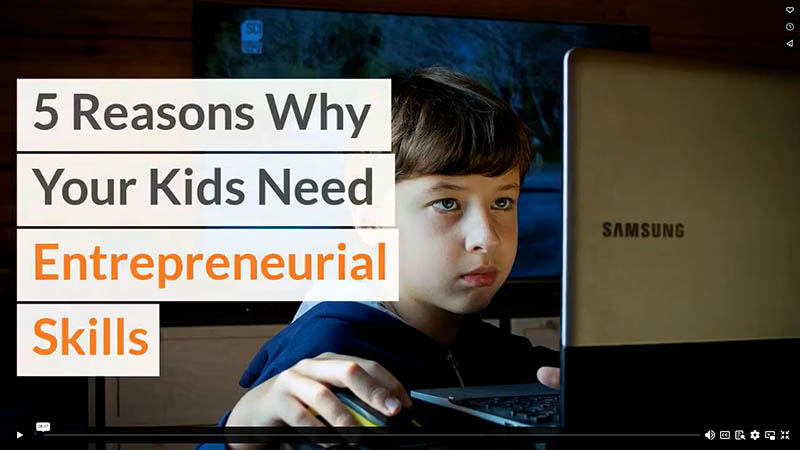You might think that being an ‘entrepreneur’ only means starting or investing in new business ventures. While that’s true, developing entrepreneurial skills allows you to succeed and innovate in any job, self-employed or not.
Today’s workplace increasingly values critical thinkers, strategists, and creative problem-solvers. As independent school educators, we believe the best time to master these capabilities is at the elementary level.
If nothing else, the global pandemic has taught us that we can’t take anything for granted. On any given day, circumstances may force us to change everything, even our basic lifestyle habits. Whoever thought there would be a time when you literally couldn’t leave your house? Or that virtual work and school would remain the new ‘normal’ for thousands of people post-Coronavirus?
In addition, the pandemic – and the subsequent inflation and financial upheaval – accelerated an already-growing trend: dropping college enrollment. Since spring 2020, total registration for post-secondary institutions (including community colleges) plummeted by 7.4%. That equates to roughly 1.3 million fewer students.
And while there are a variety of reasons for this, the main ones include the fear of amassing a ton of debt and the belief that real-world experience will be more valuable than a two- or four-year degree. Couple that with consumer giants like Google, Apple, and Costco not requiring a college degree for many of their senior-level jobs, and you have a growing break from the traditional high school-college-career path.
With or without a degree, one thing is for certain: Young people who develop entrepreneurial skills will start their careers on a much stronger footing. They’ll also be more likely to navigate a rapidly-changing work landscape with greater success.
What are some of the skills we’re talking about? We compiled our top five for you:
1. Critical Thinking
Critical thinking replaces emotion and opinion with reasoned analysis when working to identify problems and find solutions. This form of careful observation and analysis allows one to weigh the advantages and disadvantages of specific courses of action and judge how to proceed, irrespective of the status quo.
In business, critical thinking could mean digging through data to understand why one product enjoys more market appeal than another. In life, it may involve comparing your aspirations in a particular field with your natural strengths and weaknesses to determine where to focus improvement efforts.
As an entrepreneur, you constantly look for ways to improve products, services, or processes. Critical thinking gives your mind the analytical framework it needs to accomplish that.
2. Collaboration/Teamwork
True entrepreneurial spirit doesn’t exist in a vacuum. Instead, it often represents the successful amalgamation of several different ways of thinking and doing things. Some of society’s most remarkable achievements came from groups of people working together to solve a problem:
- NASA’s Apollo 11 mission to the moon
- Apple’s transformation of personal computing
- Drs. Sabin and Salk’s vaccination to eradicate polio
- The Constitution of the United States
Successful collaboration involves sharing ideas and information to encourage out-of-the-box thinking instead of punishing it. Teaching kids to work together also gives them the courage to voice their thoughts and opinions and the humility to accept that others have valuable contributions to make, too.
3. Creative Problem-Solving (CPS)
We often mistake the CPS process for brainstorming, but it’s infinitely more. Creative problem-solving is an organized process of developing a non-judgmental, open-ended flow of ideas to address a critical question or issue. As such, it involves both divergent and convergent thinking, and each plays a key role at various stages of the process.
Divergence represents laying out the problem or issue and developing several possible solutions. Convergence, on the other hand, represents a funnel of sorts in that you take those ideas and narrow them down to actionable results.
4. Communication
Perhaps one of the most critical entrepreneurial skills a person can learn is to communicate effectively. Given the popularity of our handheld devices, it’s much easier to text, email, or Snap rather than have an in-person conversation over lunch or present a new product in front of a crowd. You may have the most incredible concept on paper, but your idea is dead on arrival if you can’t successfully pitch it to an investor.
Entrepreneurship involves storytelling. You have to believe in your product or solution and then be able to sell it in such a way that an investor will want to take a chance on you. This kind of effective communication can also help in other aspects of your life. For example, are you an activist who wants to end human trafficking? Learning to tell a compelling story about how you want to carry out your strategy can secure the support and funding you need from private philanthropies and public legislators.
In addition, when kids learn how to communicate ideas and solutions, they build self-confidence. And self-confidence breeds success.
5. ‘Growth’ Mindset
Complacency is the enemy of entrepreneurship. All too often, people fall into the trap of thinking that something ‘just can’t be done.’ Be it tradition, entrenched policy, expense, or any other obstacle – we can overcome whatever It is by directing our energies toward moving forward. We face constant obstacles and challenges in our pursuits. A growth mindset builds resiliency and encourages us to see mistakes and failures as opportunities.
No child is immune from the vagaries of life, but by teaching them entrepreneurial skills at an early age, we fortify them against true failure, which is to stop trying. At The Academy of Scholars, we believe in giving your kids the tools they need to succeed at school and in life through our strong emphasis on entrepreneurship.
Infographic
The value of critical thinkers, strategists, and creative problem solvers is rising in the workplace. As independent school educators, we think that elementary school is the ideal moment to begin fostering these abilities. Young people who learn how to start their own businesses will almost always have far more solid beginnings in their professions.

Video

